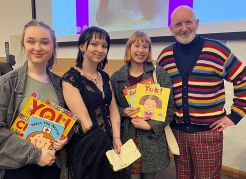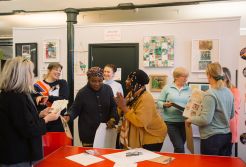Supporting people with dementia as we remove COVID restrictions is essential for wellbeing
18 May 2021
The IDoService project seeks to create vital leisure and social service for people with dementia
By Dr Isabelle Tournier, Marie Skłodowska-Curie European Research Fellow and Professor Kristina Niedderer, Professor of Design at Manchester School of Art, Manchester Metropolitan University
During this year’s Dementia Action Week (17-23 May), we reflect on how people with dementia have been profoundly affected during the COVID-19 crisis, and how design research can provide novel solutions to support people with dementia in a broad range of areas of daily life.
People with dementia have sadly accounted for a quarter of all coronavirus deaths in the UK (Alzheimer’s Society). Routines and access to services have been severely disrupted. Day centres closed their doors and vital activities such as visiting friends, seeing family, or shopping have been severely curtailed.
We all have activities we enjoy doing, at home or outside, for ourselves or with others. This may be meeting friends, helping a neighbour, volunteering, walking the dog every morning, writing poems or singing in the local choir. These activities provide us and others with wellbeing and are an important part of our daily life.
However, dementia, often combined with old age, means that engagement in leisure pursuits can become more challenging, even in the disease’s early stages.
But it does not need to be so. Campaigner Kate Swaffer, diagnosed with a form of young onset frontotemporal dementia at the age of 49, says “that there is still a good life to live even after a diagnosis of dementia, and we should be supported and enabled to continue to do so”.
While unavoidable to protect their health, and that of their loved ones, COVID-19 restrictions are frequently reported by people with dementia or their relatives to have led to a worsening of dementia-related symptoms, especially for those who have not been able to access online activities or support.
Dementia Action Week aims to encourage people to work on creating a dementia-friendly UK where those living with dementia do not feel excluded.
Our challenge now is to support those living with dementia to return to ‘normal’ and to get involved in vital leisure activities again as various COVID restrictions begin to ease.
University research
Previous University-led research, for instance the MinD project, ‘Designing for people with dementia’ led by Prof. Kristina Niedderer, highlighted that people with early to mid-stage dementia are looking for more opportunities to realise themselves and share daily activities with others.
Our challenge now is to support those living with dementia to return to ‘normal’ and to get involved in vital leisure activities again as various COVID restrictions begin to ease
That’s what our new IDoService research project seeks to help deliver. Over the next two years we aim to develop a special service to allow people living with mild dementia to plan, connect with and participate in tailored opportunities and continue to be fully part of society.
To achieve this, it is essential to have a good understanding of what people like to do, what is available to them and what is not. It is also important to know what challenges people encounter in participating in activities, how they adapt to these, and which strategies or support might help.
We will do this by actively involving people living with mild to moderate stage of dementia, their family and friends as well as other stakeholders in the field of dementia. Interviews and co-design workshops will be organised to learn more their lived or professional experience of dementia.
Their lived experience is essential to develop a user-friendly service to make it easier for people living with mild to moderate dementia to connect with relevant groups, charities, or other activity groups.
The objective is to support their wish to have more opportunities to actively take part in sociocultural activities, to contribute to society and to feel valued for the skills or expertise they have to offer.
The IDoService project is in line with local and national efforts to promote social engagement and wellbeing of people living with dementia.
Over the next two years we aim to develop a special service to allow people living with mild dementia to plan, connect with and participate in tailored opportunities and continue to be fully part of society.
In Greater Manchester, the Dementia United action plan has been launched to make Manchester one of the most dementia-friendly places in the UK. Making our communities more dementia-friendly is necessary for ensuring that people living with dementia can fully and actively contribute to them and feel understood and valued.
The importance of this work has been brought into starker focus over the last year.
Through listening to people living with dementia, and those closest to them, we can find out about what has been the biggest loss throughout our lockdowns, and what has worked – for example, online access to activities has been a fantastic resource to some.
The IDoService project will help build a resilient and tailored service for people living with dementia, not just as we emerge from the COVID pandemic, but for years to come.
The IDoService project is led by Dr Tournier, supervised by Prof Niedderer (PI) , with Laura Orton (research assistant) support. It is funded by the European programme H2020 Marie Skłodowska-Curie Action Individual Fellowships.
The IDoService team are organising a free webinar tomorrow (Wednesday May 19) for Dementia Action Week 2021, which features seven short talks about designing support and social participation to foster wellbeing during the dementia journey.
Contact: idoservice@mmu.ac.uk
Twitter: @idoservice4dem1



